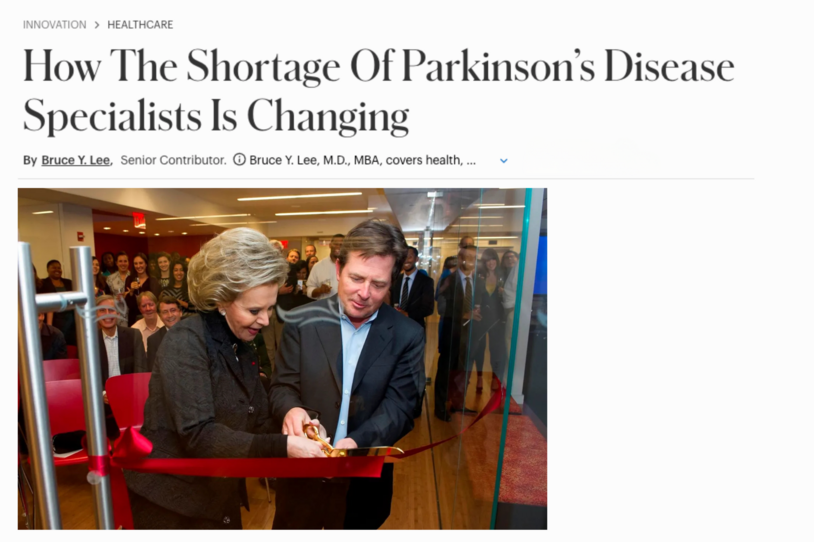
“Parkinson’s disease (PD) is a complex condition. It’s complex to diagnose and complex to handle in, oh, so many ways. It’s complex to do research and develop new treatments for this complex problem as well. And when something is complex, that’s when you call in people who know all the relevant issues through and through.”
As The Michael J. Fox Foundation (MJFF) and the Edmond J. Safra Foundation recognize the 10-year impact of the Edmond J. Safra Fellowship in Movement Disorders, a global program focused on increasing the number of movement disorder specialists, senior health Forbes contributor gives readers an exclusive look. His article titled, “How the Shortage of Parkinson’s Disease Specialists Is Changing,” explains how the unique global network of clinician–researchers trained through the Fellowship expands access to patient care and fuels research.
The article features interviews with MJFF Co-Founder and CEO Debi Brooks and the Foundation’s Principal Medical Advisor Rachel Dolhun, MD, DipABLM on the vision for the purpose-built distinguished training program and its global impact on today’s research and care landscape.
Movement Disorder Specialists are Critical to PD Care
Movement disorder specialists can deliver patient-centered care while making significant contributions to Parkinson’s research through meaningful investigations. Yet, there can be barriers to seeing a specialist, including long wait times to get an appointment and an unreasonable distance between the clinic and the patient’s home. But it’s no secret that the biggest challenge of all is that there aren’t enough of these Parkinson’s doctors for the estimated 6 million people around the world living with PD. This includes 1 million or so people and families in the U.S. as well as the many more who may develop the condition in the future. Currently, the U.S. has around 660 movement disorder specialists — meaning there is only about one specialist for every 1,000 Medicare beneficiaries living with PD. Currently, about 90 percent of people living with Parkinson’s disease in the U.S. rely on Medicare for their health care coverage.
Parkinson’s disease care is complex and often requires a team of doctors. And unfortunately getting a clinical PD diagnosis can be delayed, especially for patients who are unaware that specialty care, which can lead to a quicker diagnosis, exists. Delayed diagnoses often waste time and medical resources, suspending how soon patients can get into the right treatment programs.
“Patients can be especially likely to get misdiagnosed when they don’t match what’s believed to be the ‘typical PD profile,’” said Dr. Dolhun in the article. “There’s the misperception that it is an old white man’s disease. People can be deemed too young for PD. They don’t fit the stereotype.”
Meeting the Growing Need for PD Specialists
In 2014, The Michael J. Fox Foundation called on the vision of our longtime partner, the Edmond J. Safra Foundation, to support a durable strategy to train more movement disorder specialists.
In the last 10 years, the Edmond J. Safra Fellowship has trained 40 new clinician–researchers around the world. And, according to a recent survey of our Fellowship alumni, one Parkinson’s specialist may see an average of 780 patients every year. That means the Fellowship has had an estimated reach of over 31,000 different patients with PD so far. Now, with increased support from the Edmond J. Safra Foundation, the Michael J. Fox Foundation’s Edmond J. Safra Fellowship in Movement Disorders is on track to graduate a total of 103 new movement disorder specialists by 2031 and in turn could further access to research and care for over 80,000 patients.
As emphasized in the article, the partnership between The Michael J. Fox Foundation and the Edmond J. Safra Foundation is making a tangible impact. Through the fellowship program, selected academic institutions are provided with funding to offer additional training to neurologists wanting to focus on movement disorders. Each of the institutions is then able to find the right fellow to hire and train.
“We’ve essentially doubled the program over the course of 10 years. This is building a network and the next generation of specialists, expanding educational and research collaboration opportunities,” says Brooks.
As the network continues to expand, both Dr. Dolhun and Brooks emphasized the importance of seeing a movement disorder specialist and the impact it can make on a patient’s care. “Getting to a movement specialist early is a sign that you are empowered,” Dr. Dolhun said.
Read the full story on Forbes. Then, learn more about the Edmond J. Safra Fellowship in Movement Disorders.
Applications for the Edmond J. Safra Fellowship in Movement Disorders open on August 18, 2025.
Patients and families can also connect with a movement disorder specialist in their area.